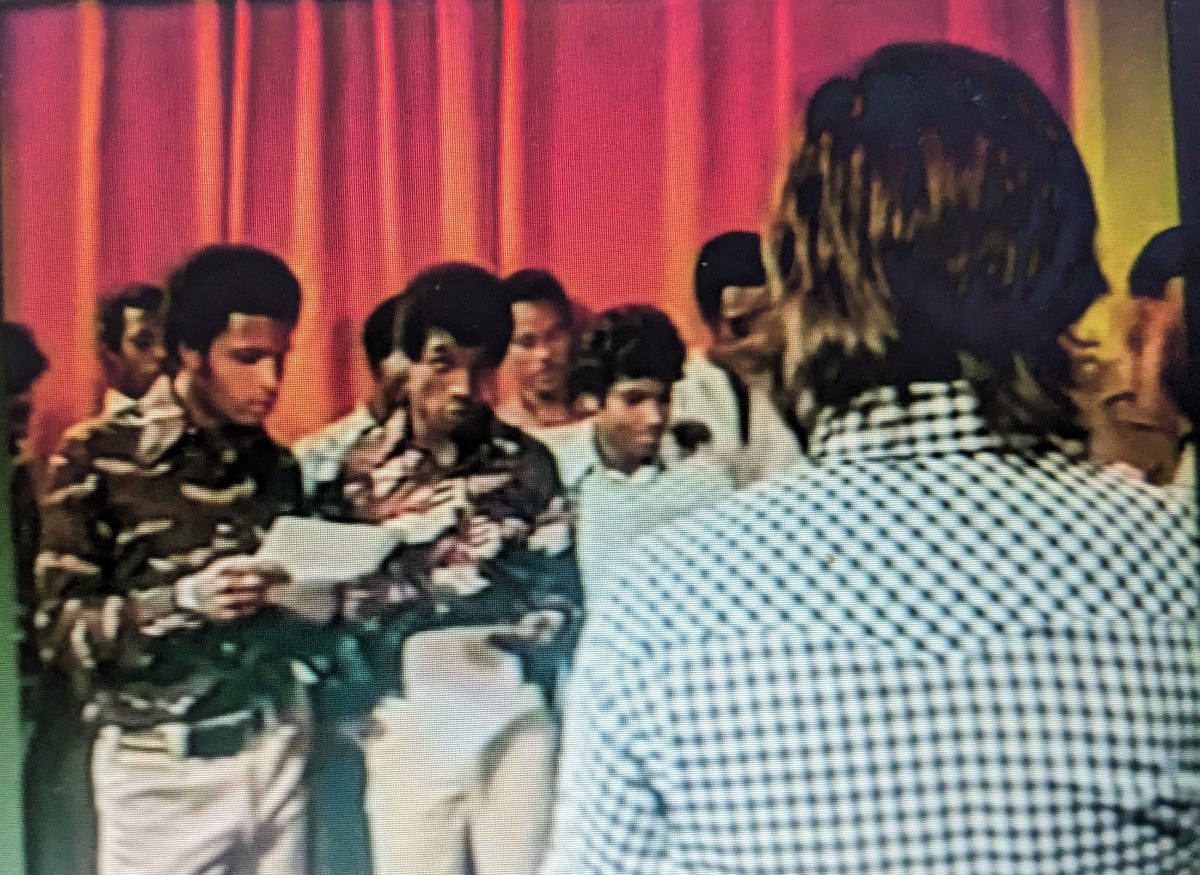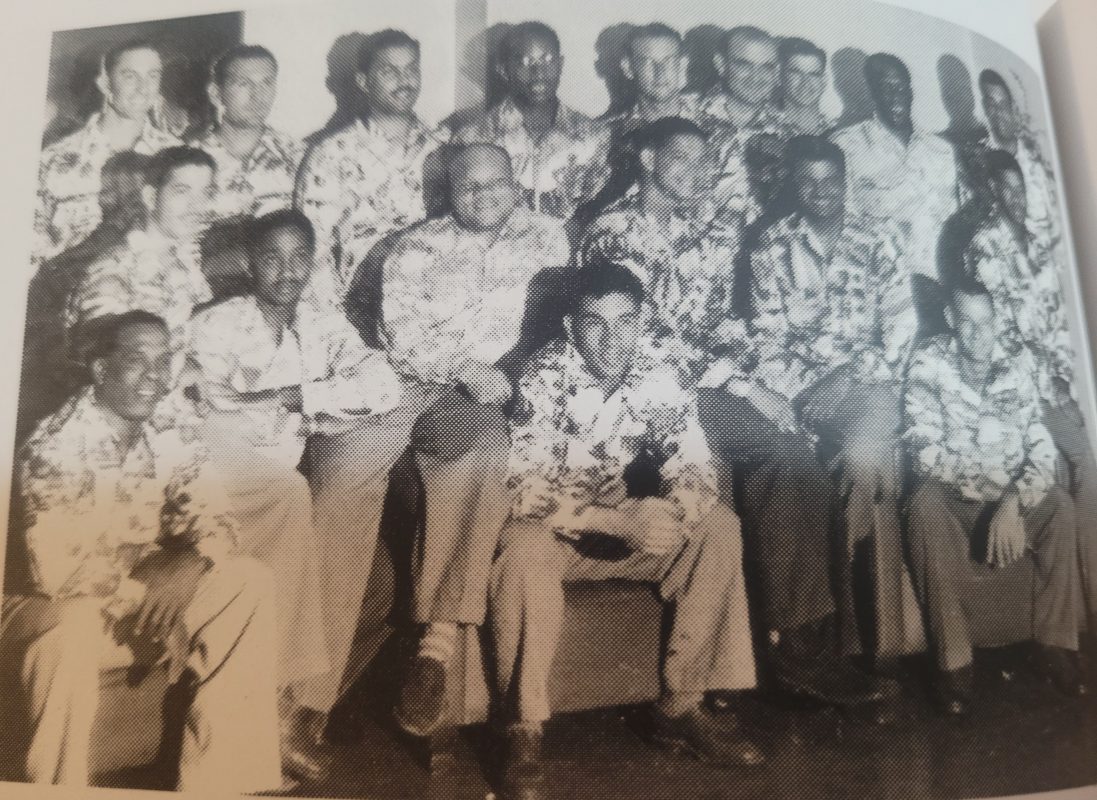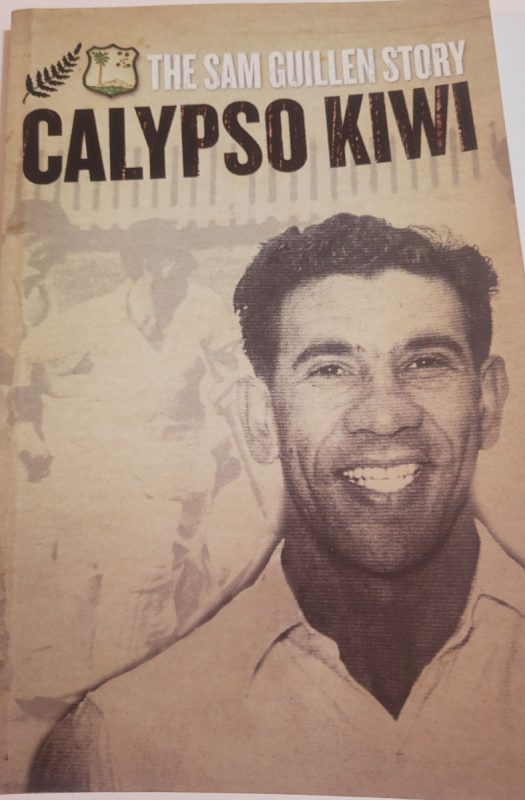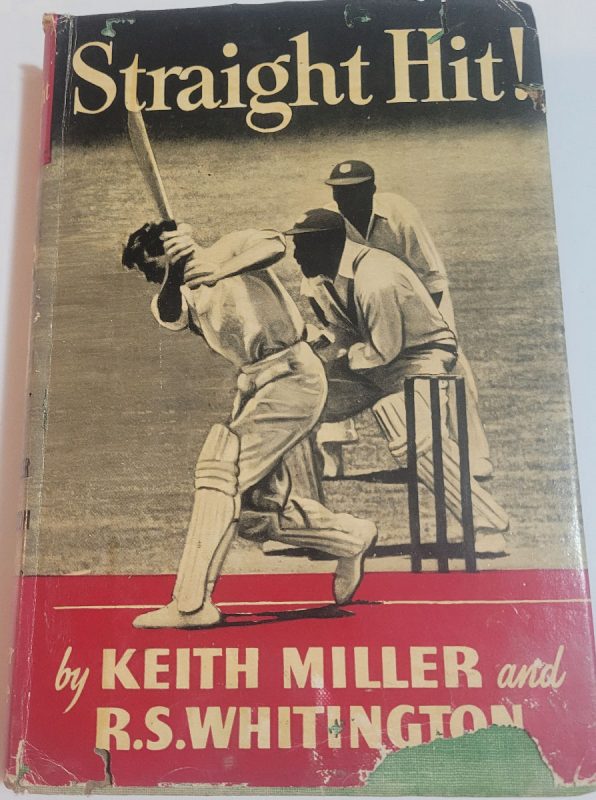In this week’s edition of In Search of West Indies Cricket, Roger Seymour continues the calypso in cricket theme from last week, by looking at a calypso composed by a West Indian cricketer which was probably better known in Australia and New Zealand than in the West Indies.
“One good thing about music, when it hits you feel no pain” – Bob Marley
Music has been a vital cog on many West Indies’ cricket tours. Apart from passing time and providing entertainment, it’s an easy avenue to cultivating team spirit and camaraderie. Among the numerous anecdotes and historical documentations, are rare (copyrighted) photographs of the 1928 West Indies team, the first official Test side, learning the Tile Trot dance steps during the annual September Scarborough Cricket Festival in Yorkshire. The festival, which dates back to 1876, signals the end of the first class season in England.
The majority of the West Indies team for the 1948/49 Tour of India – the Guianese, Trinidadian and Barbadian contingents – departed from Trinidad on the SS Cavina, a banana boat, on 19th September for England, via Jamaica, where George Headley boarded at Bowden. It was a long trip and the boat finally docked on 12th October at Avonmouth, near Bristol. In “Jeffrey Stollmeyer’s Diary” – an extremely detailed account of the India Tour extracted from the daily letters Jeffrey penned to his wife Sara, which she faithfully preserved for many years before they formed the basis of the 2004 book – the scribe recalled the team bonding over the singing of calypsoes. The young Trinidadian opening batsman composed two calypsoes (not cricket related), “Perspiration on the Cavina” and “Excursion to England” on the trip, which the team, accompanied by Trinidadian fast bowler Prior Jones on piano, duly sang at the boat’s farewell concert party, stealing the show. The musical tone for future touring parties was cast on that initial leg of the first post-war trip. The team, which was joined by Jimmy Cameron, a student in England, then departed from Heathrow Airport in London on 16th October on an Air India flight and arrived in Bombay on 17th October.
In Chapter Eight of his book “History of West Indies Cricket Through Calypsoes” (2016), Nasser
Khan wrote: “There would have been many other calypsoes sung to herald the various cricket personalities and topics of the day … that have not been recorded or documented.”
The cricketing world had been introduced to the art form of the calypso following the glorious West Indies’ victory in the Second Test at Lord’s in 1950. Its arrival Down Under on the 1951/52 West Indies Tour of Australia and New Zealand (In Search of West Indies Cricket – Christmas cricket Down Under, 24th December, 2023) was duly recorded in “Straight Hit!” (1952) by Keith Miller and R S Whitington, one of several published accounts of the tour.
Miller, an outstanding all-rounder, is best remembered for the lethal new ball partnership he formed with Ray Lindwall. Miller played 56 Test matches for Australia between 1946 and 1956, scored 2,958 runs at an average of 36.97, and took 170 wickets at the miserly cost of 22.97. Miller scored four centuries against the West Indies in ten Test matches in two series; 129 in the first innings of the Second Test of the 1951/52 tour at Sydney, and three on the 1955 Australian tour of the Caribbean. West Indies Captain John Goddard once voiced, “Give us Keith Miller and we’d beat the world.” Having crossed paths with the legend Don Bradman, the Godfather of Australian cricket, he was never honoured with the Test captaincy.
Richard Smallpeice Whitington was a former South Australian cricketer who became a prominent journalist and writer. He wrote several books on cricket; seven collaborations with Miller, three with other individuals, and 16 on his own.
“Straight Hit!” is composed of 12 chapters divided into two parts, with the second half dedicated to the West Indies vs Australia Test series. In Chapter Six, ‘Calypso Intermezzo’ the authors delve into the depths of the calypso and the West Indies team’s resilient spirit, which was often kept alive by their merciless “ragging” of each other. Here is an excerpt from that chapter.
“Some Australians gained the impression from a series of jaundiced reports that the West Indian party was given to galas of gloom and delusions of depression. On the contrary, whether the team had just won a Test against Australia or lost a minor game as a consequence of a day of dropped catches or suicidal batting sacrifices, the team’s Calypso commandants, Jeff Stollmeyer, Gerry Gomez and Simpson Guillen (all Trinidadians), would form a group around the hotel piano (often assisted by BBC Representative Ernest Eytle, a former West Indian [Guyanese] now resident in England) and strike up such famous calypso tunes as ‘The Peanut Vendor’, ‘Rum and Coca-Cola’, ‘Kitch’ – the song of the girl Bernice, ‘Nora’ and others of more Bohemian inspiration.”
The writers noted that Ramadhin was prominently featured in the calypsoes written subsequent to the 1950 Lord’s victory. Down Under he was often the favoured target of the team’s “ragging” as portrayed in “the 1951-2 West Indies team’s hit song ‘Hassett and Ramadhin’, which was composed by the French-descended Guillen after Hassett and Miller had made the first Australian stride towards exploding the mysteries of Sonny’s perplexing delivery.
“We now reproduce the words of this song with ‘Sammy’ Guillen’s kind permission.
“Hassett and Ramadhin
Verse I
Ram called Hassett a rabbit,
But the Indian boy he regret it.
Ram called Hassett a rabbit,
But the Indian boy he regret it.
Ram bowled seriously,
But he was knocked to the boundary,
Hassett made a century,
And Miller followed immediately.
Chorus
We want Ramadhin on the ball
We want Ramadhin on the ball
We want Ramadhin on the ball
Keep want him on the ball and a lot of runs on the board
Verse II
Val bowling at one end,
And Hassett started to defend.
Skipper John got a headache,
Seeing Hassett make no mistake.
The crowd started to shout,
When Rammie was knocked out.
I sat down and cried,
To see how Hassett made Ram a child.
Chorus
Verse III
Ram is a magic bowler,
He said he climbed rope all up in India.
Christiani is known as Mandrake,
And Worrell dressed up like fruit cake.
Poor Fergie can’t get a bowl,
He ‘s asking how wickets will fall.
We can’t win a match,
We only dropping the people catch.
Chorus
Verse IV
The tourists in this family,
Are Denis, John Trim and Sammy.
They played a match up in Queensland,
And they are booked for one in New Zealand.
As tourists we failed to click,
Every innings Ram getting stick.
I had a big laugh,
When Ram asked to join the groundstaff.
Chorus.”
So that’s Guillen’s calypso, carefully documented some 70-odd years ago. It was probably never recorded for West Indies cricket fans to savour (I am still searching to confirm that). In his autobiography, “The Sam Guillen Story Calypso Kiwi” (2005), Guillen confirmed penning the song in a solitary line: “This is a calypso I made, which we all sang during the tour of Australia.” The song is reproduced in its entirety at the end of Chapter Five, ‘The New Zealand Leg.’
Guillen, from all accounts, was quite an inimitable character, who possessed that ‘Trini’ trait of finding humour in the most difficult of circumstances. There he was, with the West Indies down 0 – 2 in the series, tearing the great Ram, his fellow countryman and teammate, apart. Guillen likely penned this calypso after the Second Test, during which the Australian Captain Lindsay Hassett, 132, and Miller, 129, had plundered the West Indies attack. Despite posting 362 after being asked to bat first, the West Indies lost by seven wickets. Ramadhin had been pummelled into submission. In the first innings, his 41 overs, with seven maidens, cost 143 runs for no wicket. In the second innings, his figures read: 12.3 – 1 – 53 – 1. In the First Test at Brisbane, which Australia won by three wickets, Ram’s returns were decent: 24 – 5 – 75 – 1; 40 – 9 – 90 – 5.
Guillen appeared to have ‘borrowed’ his chorus from another calypso, “Ramadhin on the ball” (1951), which had been written by King Radio, the calypsonian sobriquet of Norman Spann. Radio had previously composed “Bodyline” in 1936. The eight-line stanzas adopted by Radio and Guillen seemed to be the standard of the time. Miller and Whitington were obviously unaware of Radio’s composition and made no mention of it. Guillen did not reference Radio either.
Here is the first verse and chorus of King Radio’s composition.
Ramadhin on the ball (1951)
We enjoyed a grand celebration
To our governor’s instructions
We enjoyed a grand celebration
To our governor’s instructions
He said enjoy yourselves in the best o’ way
And remember it’s Ramadhin’s day
That was bacchanal
We played Carnival for that festival
We want Ramadhin on de ball
We want Ramadhin on de ball
We want Ramadhin on de ball
Bring him on de ball
In an hour all the wicket will fall
There were two other calypsoes composed for that fateful 1951/52 Tour of Australia. “Australia versus West Indies” by Lord Beginner (1952) and “Why the West Indies Lost the Rubber in Australia” by Lord Pretender (1952). In the latter, Pretender waylaid the Australian umpires and the tour arrangements.
There is a hilarious video of the 1975/76 West Indies team to Australia making a television commercial for Brut Shampoo. The lead singers appear to be Trinidadian Bernard Julien and Guyanese Len Baichan. The several takes of the team’s attempt at singing harmony often erupted in hopeless giggling. The over-50 folks will remember the combo of Richie Richardson on guitar and Curtly Ambrose on vocals celebrating another series triumph surrounded by jubilant teammates in the mid-1990s. The younger generation can instantly source online videos of the 2012 and 2016 T20 World Cup winning squads singing and dancing at the presentation ceremonies, or Dwayne Bravo belting out his “Champion” composition.
Music, calypso especially, will always be part of West Indies cricket.
……………………………..
Missing lyrics
Despite Nasser Khan’s gallant efforts he was unable to unearth the lyrics for some known cricket calypsoes. Perhaps someone else will stumble on them.





